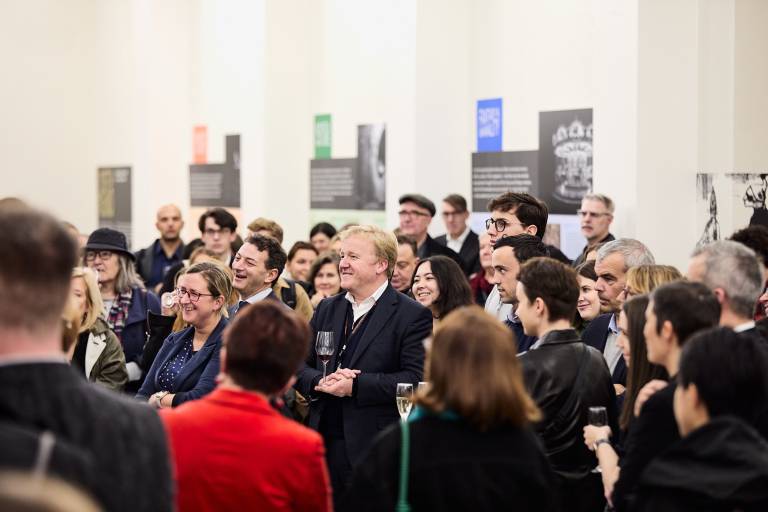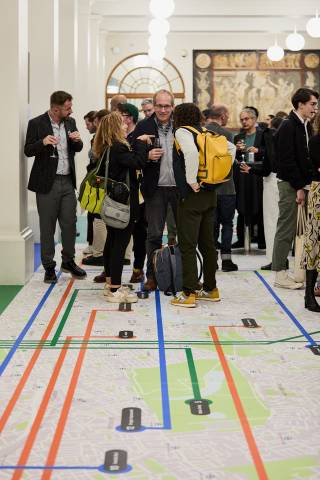Interactive map and exhibition show Europe’s literary links with London
27 October 2023
Stories of the streets of London are brought to life in an interactive digital map developed by UCL experts, making it possible to explore the city through the eyes of European writers, artists and intellectuals, through the ages.

Curated by the UCL European Institute, UCL Faculty of Arts and Humanities and the UCL Bartlett Centre for Advanced Spatial Analysis, Lost & Found: A European Literary Map of London showcases texts written in over 20 languages, with each location the site of a real or imagined encounter with London by a European writer.
The map captures and explores the impact London has had on writers such as Danish author Hans Christian Andersen, who in his first encounter with London in 1847 referred to it as “the city of cities”, as well as a letter written by Vincent van Gogh, who lived in South London for three years in the early 1870s. Other names include Giacomo Casanova, Karl Marx, Victor Hugo and Joseph Conrad, alongside contemporary authors from Ananda Devi to Cristina Marconi.
A public exhibition based on the map launced on 24 October 2023 and will run in the South Cloisters in UCL’s Wilkins Building until May 2024, brings to life the online resource in an immersive display, illustrating London’s rich history as a hub for cultural exchange.
The exhibition will form the backdrop for a series of associated activities throughout the year designed to inspire critical engagement with the texts on the map, source new entries and stimulate fresh writing on London.
Dr Uta Staiger is the Executive Director of the UCL European Institute and a member of the team behind the map. She said: “This exhibition, and the map on which it is based, encourages us to reflect on London as a place in the European imagination, a capital city where journeys and languages have historically intersected, where people and cultures continue to meet and are transformed.
“It is fitting for UCL to be leading this project given our rich tradition of scholarship on European languages and cultures, our connections to cultural organisations across the capital and the continent, and our status as London’s Global University.”
Alongside the launch of the map and exhibition will be a new Writer in Residency programme, run in partnership with EUNIC London (European Union National Institutes for Culture) – who are also partners in the development of the literary map – the European Literature Network, the Delegation of the European Union to the United Kingdom, and with the support of Geothe-Institut London. The Residency will commission a contemporary European author to spend four weeks embedded within UCL Arts and Humanities and to produce original writing on London.
With priority given to writers from diverse or otherwise under-represented groups, the aspiration behind this Residency is to diversify both the map and how we collectively imagine and understand both London and Europe. The selected writer will be involved in the 2024 European Writers’ Festival and will use the map to inspire young writers at UCL and schools in our local boroughs.
His Excellency Pedro Serrano, EU Ambassador to the United Kingdom, said: “This exhibition and the wider European Literary Map of London project illustrate beautifully the longstanding and enduring cultural connections between the UK and the European continent, and the important role of the written word in building cross-cultural bridges and expanding our collective understanding.
“The EU Delegation is delighted to be working with our partners to deliver the Writer in Residency scheme with a focus on stimulating new encounters with London, and new writing on the city, by writers representing all aspects of society.”
London’s Deputy Mayor for Culture and the Creative Industries, Justine Simons OBE, said: “Diversity is our city’s greatest strength, and this engaging exhibition celebrates London’s rich blend of people and cultures and the fascination of European writers through history with the capital. It also highlights the power of art and creativity and their significant role in our history. Writers shape the narrative and stories we hear about our city and inform our understanding of it and, as London retains its enduring appeal for artists from across Europe and the world, creatives continue to play a key part in building a better London for everyone.”
The exhibition launch event was held at UCL on Tuesday 24 October, 17:30, featuring four speakers: His Excellency Pedro Serrano, EU Ambassador to the United Kingdom; Professor Alan Thompson, Pro Provost (London) and Dean of the Faculty of Brain Sciences; Rosie Goldsmith, Director of the European Literature Network; and Lucy Shackleton, Head of Public Policy and Partnerships, UCL European Institute.

Links
- The interactive map can be found at Lost & Found: A European Literary Map of London
- Find out more about the European Literary Map of London project
- UCL European Institute
- UCL Faculty of Arts and Humanities
- UCL Bartlett Centre for Advanced Spatial Analysis
 Close
Close

